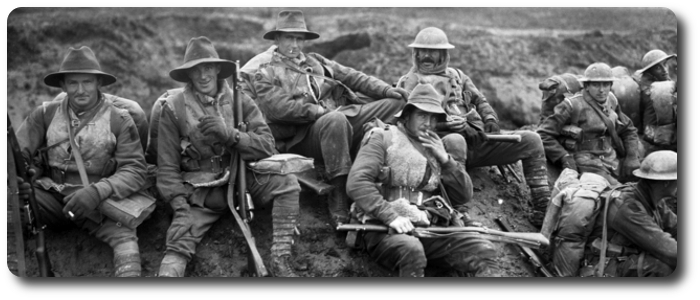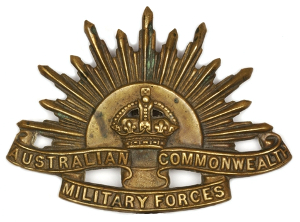Topic: Discipline

Australian Soldiers; The Question of Discipline (1916)
The Sydney Morning Herald, 5 February 1916
By Sergeant
 The most heartbreaking part of an officer's or N.C.O.'s work during the period of recruit training is to educate Australians to submit to discipline. It is almost an impossibility to teach a new man to instantly obey and order, and to get him into the soldierly habit of coming to attention when addressing anyone of superior rank, or saluting when passing him in camp or elsewhere. It necessitates a very complex knowledge of the Australian character to account for this peculiarity in the men, and a study of his individuality, descent, and all the influences at work upon the man from infancy to adult life, before an officer may consider himself qualified to handle new recruits, and change their modes of thought.
The most heartbreaking part of an officer's or N.C.O.'s work during the period of recruit training is to educate Australians to submit to discipline. It is almost an impossibility to teach a new man to instantly obey and order, and to get him into the soldierly habit of coming to attention when addressing anyone of superior rank, or saluting when passing him in camp or elsewhere. It necessitates a very complex knowledge of the Australian character to account for this peculiarity in the men, and a study of his individuality, descent, and all the influences at work upon the man from infancy to adult life, before an officer may consider himself qualified to handle new recruits, and change their modes of thought.
The average Australian is in most cases descended from parents and grandparents who, by nature of their own bringing up, were free of all restraint. In the infant days of colonisation—going back beyond the date when the convict system was abolished—the conditions of life were hard and pitiless in the extreme. The gradual opening up of the back country called forth a type of men and women who had fearlessly and doggedly to face privations, loneliness, and hardships. From this class there descended and even more independent generation, which, inheriting all the pluck and endurance of their parents, had added to these qualities an unalterable love of freedom, inseparable from their mode of life. The "bush" had to be conquered. They were a law unto themselves, resenting interference; each endeavouring to carve out a path for himself; and with little aid from the Government. So strenuous was the existence, so bitter the disappointments, as obstacle after obstacle was attacked—often only to be found insurmountable—that the combative spirit, inherent be reason of descent from British stock, was increased in parents and transmitted to offspring. Each individual acted independently for his own ends. Children, from mere infancy, were allowed the utmost freedom, and taught to do each one for itself. They grew up strong in their belief in their own ability to conquer in the battle of life. Not trained in strict obedience even to their parents, they took orders from none, and never learnt discipline.
Another factor to be reckoned with in considering the influences at work in forming the character of the present generation is the absence, especially in the country, of class distinctions. Birth and education counted for next to nothing. Money and success alone talked. But the rick man knew better than to expect servility and obedience from his poorer countrymen. It was not in their nature to humble themselves to anyone. If work was offered, the labourers sold their knowledge and power alone for wages agreed upon, but did not feel called upon to treat their employers with the respect which is part of a similar bargain in older countries. The employer was called "boss" not "sir."
As the colonies grew in importance, and education became compulsory, the literature eagerly devoured on all sides dealt with the operations of bushrangers and convictism, the minds of the young people turning naturally to deeds of daring and unlawfulness, there being more excitement in such reading than in the books which a differently descended and trained people would choose. Besides, the parents in many cases had come into personal conflict or friendly communication with the outlaws, and the tales of the doings of these desperate men appealed to the readers as touching on acts perpetrated at their doors. All of this had a tremendous effect upon the rising generation, and is reflected in the character of our soldiers, as may be witnessed in their behaviour in camp, and their utterly fearless conduct when facing the enemy in the present war.
To such a bold, independent people the idea of discipline is accounted a sign of weakness. It is this feeling which makes the recruit shuffle up to an officer and salute in a half-hearted way. He thinks his mates will twit him for it. For this reason saluting is not popular. The recruit cannot get the idea out of his head that he is acknowledging in public his inferiority. It is no use telling him to salute his superior officer is merely discipline. He knows not the word. It is "double Dutch" to him. All he see in front of him is a fellow-man. Nothing more. Why should he salute him? You have to take these recruits in hand just as a school-master does new boys. First study their disposition. No two are alike. One may be dull but good-tempered so long as you don't rub him the wrong way. Another is smart and quick to learn. Yet another is conceited, and with ignorance added is the most difficult to deal with. All are fearless. They must be taught as you would teach children the A B C. Gradually and firmly, taking care not to tire either mind or body, making the work interesting, and watching for inattention which must be nipped in the bud. Finding fault with individuals in the presence of their mates should never be permitted; but insubordination must not be allowed. Instruction and example, or detail and demonstration, cannot be carried too far. Recruits are very imitative. They mostly all want to learn, and are attracted more by what they observe than most officers think. This is very noticeable when the men first get into uniforms after a period in dungarees. The change is sometimes marvelous. From slow, slouching fellows, they blossom out into smart, upright soldiers eager for further training, but never altering in their dislike for discipline.
All this, it is said, alters after going to the front. Hourly association with British troops effects a change. It is not the severity of the English officers. It is imitation! They face into line with the British "Tommies" simply because they do not want to behind in anything. The spirit to conquer asserts itself. If discipline added to their other good qualities will place them first in the eyes of the world, then discipline it is!
If officers and N.C.Os. would give some consideration to the foregoing remarks, and endeavour to study the recruits individually, much better results would accrue. You can lead Australians, but you cannot drive them. Properly handled, they are the finest men in the world. But those who would lead them must understand and know that, and become acquainted with all the influences which are and have been at work for a hundred years in forming their characters, otherwise the labour of teaching and training is lost.

